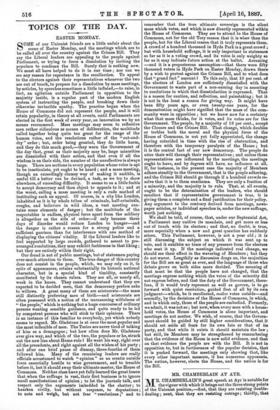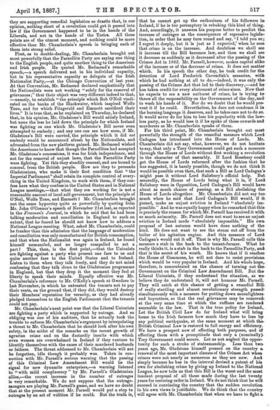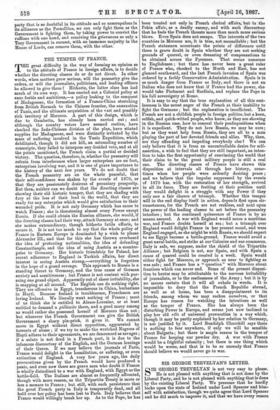MR. CHAMBERLAIN AT AYR.
M.R. CHAMBERLAIN'S great speech at Ayr is notable for the vigour with which it brings out the three strong points of the Unionist position,—flrst, that they are resisting doable- dealing; next, that they are resisting outrage ; thirdly, that
they are supporting remedial legislation so drastic that, in our opinion, nothing short of a revolution could get it passed into law if the Government happened to be in the hands of the Liberals, and not in the hands of the Tories. All these points are of the utmost moment, and nothing could be more effective than Mr. Chamberlain's speech in bringing each of them into strong relief.
First, as to double-dealing, Mr. Chamberlain brought out most powerfully that the Parnellite Party are saying one thing to the English people, and quite another thing to the American and Irish people. He quoted Mr. Redmond's remarkable speech,—a speech delivered not in his individual capacity, but in his representative capacity as delegate of the Irish Nationalist Party,—at the Chicago Convention of last year. At that Convention, Mr. Redmond declared emphatically that the Nationalists were not working "solely for the removal of grievances ;" that their object was very different indeed to that, —namely, to establish "the principle which Rob O'Neil vindi- cated on the banks of the Blackwater, which inspired Wolfe Tone, and for which Fitzgerald and Emmett sacrificed their lives." It is true that, as he explained on Thursday, he declared that, in his opinion, Mr. Gladstone's Bill would satisfy Ireland, but none the less he laid down the principle for which Ireland was fighting as one which Mr. Gladstone's Bill never even attempted to embody ; and any one can see how soon, if Mr. Gladstone's Bill were carried, the principle which it did not embody would be announced afresh by the Nationalists, and advocated from the new platform gained. Mr. Redmond wished the Americans to know that though the Parnellites had accepted Mr. Gladstone's concessions, it was for Irish independence, and not for the removal of unjust laws, that the Parnellite Party were fighting. Yet this they steadily conceal, and are bound to conceal, from the British people. How are they to persuade Gladstonians, who make it their first condition that "the Imperial Parliament" shall retain its complete control of every- thing in the United Kingdom, to work with them, if they con- fess here what they confess in the United States and in National League meetings,—that what they are working for is not a reasonable amount of local self-government, but the principle of O'Neil, Wolfe Tone, and Emmett? Mr. Chamberlain brought out the same hypocrisy quite as powerfully by quoting from Mr. John O'Connor's speech of November 21st last, as reported in the Freeman's Journal, in which he said that he had been talking moderation and conciliation in England to such an extent, that he feared he should not know how to address a National League meeting. What, asked Mr. Chamberlain, could be franker than this admission that the language of moderation and conciliation was only manufactured for British consumption, and that when the Nationalist was again in Ireland, he found himself unmuzzled, and no longer compelled to act a part? This, then, is the first point,—that the Unionists are fighting against a party who present one face to us and quite another face to the United States and to Ireland. Listen to them when they talk freely, and they do not mind confessing that they talk down to the Gladstonian programme in England, but that they drop it the moment they feel at liberty to speak their minds. Equally effective was Mr. Chamberlain's reference to Mr. O'Kelly's speech at Owedore in last November, in which he entreated the tenants not to pay their rents, on the ground that, if they did, they would destroy their Members' reputation for veracity, as they had already pledged themselves to the English Parliament that the tenants could not pay. Mr. Chamberlain's next point was that the Liberal Unionists are fighting a party which is supported by outrage. And so obliging was one of his auditors, that he actually took the trouble to enforce Mr. Chamberlain's argument by interpolating a threat to Mr. Chamberlain that he should look after his own safety, in the midst of the remarks on the recent growth of agrarian crime and on the dastardly insults with which
even women are overwhelmed in Ireland if they venture to identify themselves with the cause of their murdered husbands or fathers. The threat addressed to Mr. Chamberlain will not be forgotten, idle though it probably was. Taken in con- nection with Mr. Parnell's serious warning that the passing of this Criminal Law Amendment Bill would be the signal for new dynamite enterprises,—a warning listened to "with mild complacency " by Mr. Parnell's Gladstonian allies,—the recent increase in the number of outrages is very remarkable. We do not suppose that the outrage- mongers are playing Mr. Parnell's game, and we have no doubt
that at the present moment Mr. Parnell would put a stop to outrages by an act of volition if he could. But the truth is, that he cannot get up the enthusiasm of his followers in Ireland, if he is too peremptory in rebuking this kind of thing. And, accordingly, it answers his purpose better to predict the. increase of outrages as the consequence of repressive legisla- tion, in order that he may turn round and say, 'I told you so; I regret it deeply, but it is just as I expected,' when he sees that crime is on the increase. And doubtless we shall see it increase till the Bill becomes law, and then we shall see it decrease as suddenly as it decreased after the passing of the Crimes Act in 1882. Mr. Parnell, however, makes capital alike of the increase or of the decrease of crime. It does not matter which. In his speech the other day, he took credit for the detection of Lord Frederick Cavendish's assessing, with. which he had nothing at all to do,—indeed, it was only the• passing of the Crimes Act that led to their discovery,—and he has taken credit for every abatement of crime since. Now that he expects to see a new outburst of crime, he is trying to. throw all the responsibility on the Government of the day, and to wash his hands of it. Nor do we doubt that he would pre. vent it if he could. Nevertheless, he dare not condemn it in the burning language it deserves, and he takes care not to do 80: It would never do for him to lose his popularity with the law,- less party, as he would lose it if he spoke of these cowards and murderers as Mr. Chamberlain speaks of them.
For his third point, Mr. Chamberlain brought out most powerfully the strength of the remedial measure which Lord Cadogan has introduced into the House of Lords. Mr. Chamberlain did not say, what, however, we do not hesitate to say, that only a Tory Government could get such a measure through the House of Lords without first working a revolution in the character of that assembly. If Lord Rosebery could get the House of Lords reformed after the fashion that he has suggested, it is barely possible, though we do not think it would be possible even then, that such a Bill as Lord Cadogan's might pass it without Lord Salisbury's official help. But assuredly, the House of Lords being what it is, if Lord Salisbury were in Opposition, Lord Cadogan's Bill would have about as much chance of passing, as a Bill abolishing the House of Lords altogether. Mr. Chamberlain did not say too• much when he said that Lord Cadogan's Bill would, if it passed, make an unjust eviction in Ireland "absolutely im- possible." And he was equally happy when he remarked that this. is precisely the reason for which Mr. Parnell has received it with so much animosity. Mr. Parnell does not want to see an unjust eviction in Ireland made "absolutely impossible." His own proposal of last autumn would have done nothing of the kind. He does not want to see the steam cut off from the boiler of his agitation engine. And this measure of Lord Cadogan's would cut it off. That is why Mr. Parnell calls this measure a stab in the back to the tenant-farmer. What he really thinks it, is a stab in the back to the Parnellite Party, and that is the secret of his wrath. He knows that if it remixes. the House of Commons, he will not dare to resist provisions. which would be very popular in Ireland. And his whole hope,. therefore, is concentrated on the chance of turning out the Government on the Criminal Law Amendment Bill. But the Liberal Unionists, if they understand the situation, as we believe they do understand it, will not humour Mr. ParnelL They will catch at this chance of getting a remedial Bill, of really startling and almost revolutionary strength passed; simultaneously with a measure for putting down moonlighters- and boycotters, so that the real grievances may be removed, at the very same time at which the ruffians are rendered amenable to the law. That is the tree policy for Ireland- Let the British Civil Law do for Ireland what will bring home to the Irish farmers how much they have to lose by any political earthquake, at the same moment at which the British Criminal Law is restored to full energy and efficiency. We have a prospect now of effecting both purposes, and of
effecting them with a promptitude that only a (nominally>
Tory Government could secure. Let us not neglect the oppor- tunity for such a stroke of statesmanship. Less than two.
years ago, Mr. Gladstone himself pressed on the country a renewal of the most important clauses of the Crimes Act when crimes were not nearly as numerous as they are now. And
simply became he has in the interval devised a patent of his
own for abolishing crime by giving up Ireland to the National League, he now tells 9B that this Bill is the worst and the most insolent proposal of all those made during the last twenty years for restoring order in Ireland. We do not think that he will succeed in convincing the country that the sudden revolution
in his own views is justifiable. We do think that the country will agree with Mr. Chamberlain that when we have to fight a. party that is so doubtful in its attitude and so unscrupulous in its.alliances as the Parnellites, we can only fight them as the Government is fighting them, by taking power to convict the ruffians with one hand, and removing the grievances as only a Tory Government in earnest, with an immense majority in the House of Lords, can remove them, with the other.




































 Previous page
Previous page